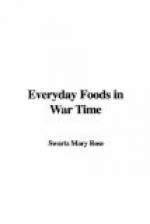Meat is highly regarded as a source of iron; but, again, it has no monopoly of this important building-stone in the house of diet. The eggs, or peas, or half the beans mentioned above would any one of them furnish more iron than the lamb chop, while a quarter of a cup of cooked spinach or a small dish of string beans would furnish quite as much. Besides green vegetables, fruit, and the yolk of egg, cereals are a not inconsiderable source of iron. A man would have adequate nourishment for a day, including a sufficient supply of iron, if he were doing only moderate physical labor, from one pint of milk, one and one-half pounds of whole wheat bread, and three medium-sized apples. Beef juice is often used as a source of iron for children and undoubtedly it is one which is palatable and digestible, but it takes a quarter of a pound of beef to get a few tablespoonfuls of juice, and a tablespoonful of juice would hardly contain as much iron as one egg yolk; and it seems probable that the iron of the egg yolk would be better utilized for the making of good red blood.
Meat is good fuel for the human machine if used in moderate amounts along with other food. But meat is no better fuel than other food. An ordinary lamb chop will furnish no more calories than a dish of oatmeal, a piece of bread an inch thick and three inches square, a large apple or banana, an egg, five ounces (five-eighths of a cup) of milk, or a tablespoonful of peanut butter. The fatter meat is the higher its fuel value (providing the fat is used for food). A tablespoonful of bacon fat or beef drippings has the same fuel value as a tablespoonful of butter or lard, or as the lamb chop mentioned above. The man who insists that he has to have meat for working strength judges by how he feels after a meal and not by the scientific facts. While in the long run appetite serves as a measure of food requirement, we can find plenty of instances where it does not make a perfect measure. Some people have too large appetites for their body needs and get too fat from sheer surplus of fuel stored in the body for future needs as fat. If such people have three good meals a day all the time, there never is any future need and the fat stays. Other people have too small appetites for their needs and they never seem to get a surplus of fuel on hand. They live, as it were, from hand to mouth. Anyone accustomed to eating meat will have an unsatisfied feeling at first after a meal without meat. The same is true of other highly flavored foods. It is well for the cook to bear this in mind and serve a few rather highly seasoned dishes when there is no meat on the bill of fare. A very sweet dessert will often satisfy this peculiar sensation, and it can be allayed, at least in part, by the drinking of water some little time after the meal. Such a sensation will pass away when one becomes accustomed to the change in diet. It is probably due to certain highly flavored substances dissolved in the meat juices which are




